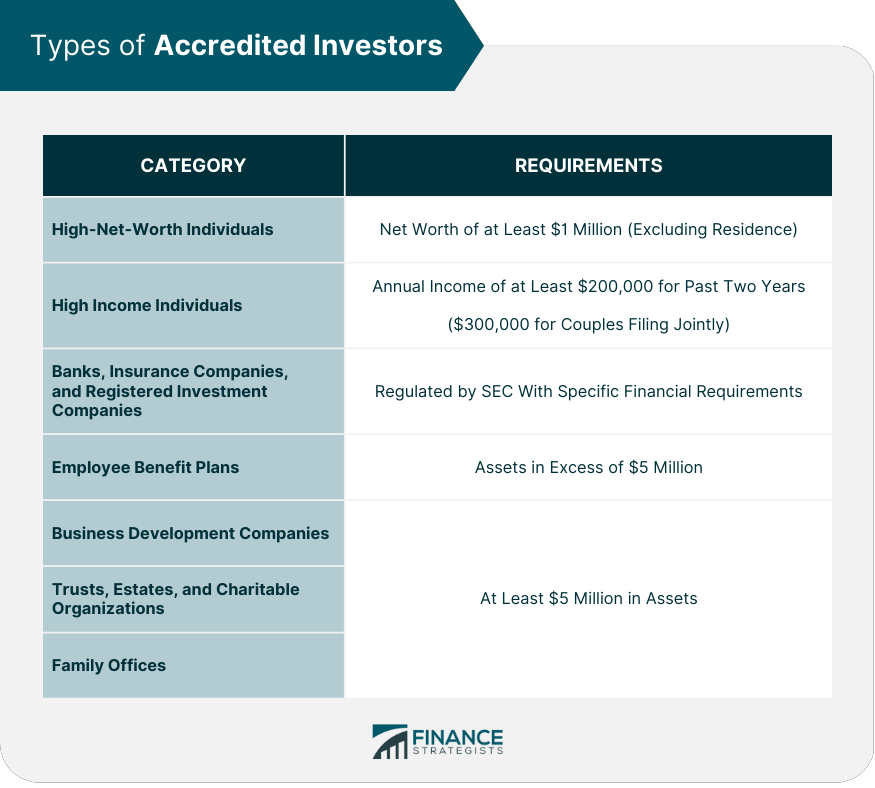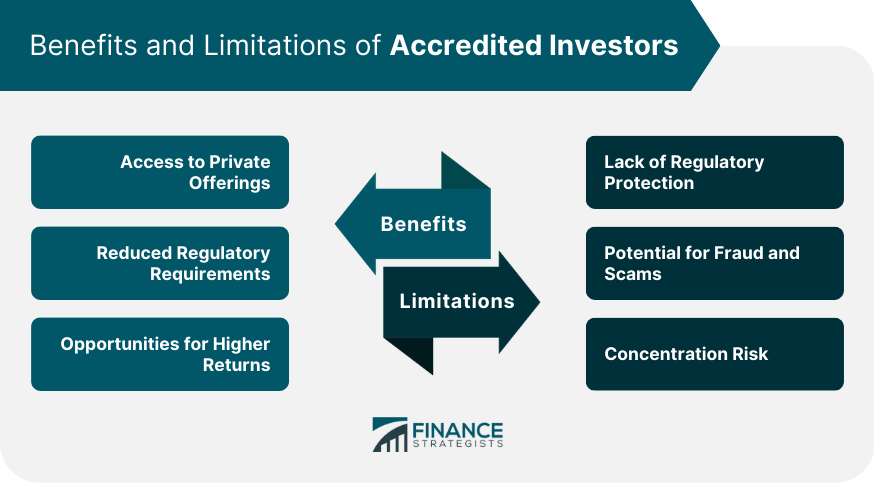Accredited investors are individuals or entities that meet certain financial requirements and are eligible to invest in securities that are not available to the general public. The Securities and Exchange Commission (SEC) defines accredited investors as those who have a net worth of at least $1 million (excluding their primary residence) or an income of at least $200,000 for the past two years (or $300,000 for couples filing jointly) with the expectation of the same income level in the current year. The purpose of accrediting investors is to protect them from the risks associated with investing in unregistered securities by ensuring that they have the financial resources and knowledge to make informed investment decisions. The importance of accredited investors in financial markets cannot be overemphasized. They play a critical role in providing capital to companies that are not yet publicly traded or are unable to raise funds through traditional financing channels. As a result, accredited investors provide a source of liquidity and access to capital for businesses that are still in their developmental stages, which can create significant returns for investors who have the necessary financial resources to participate in these opportunities. Other criteria for accreditation include holding certain professional certifications, being a registered investment advisor, a broker-dealer, or an executive officer, director, or general partner of a company issuing the securities. The SEC also provides an exemption to banks, insurance companies, and registered investment companies, employee benefit plans, and other entities that meet specific financial criteria, allowing them to qualify as accredited investors. Accredited investors can be divided into two categories: individuals and entities. Each category has different requirements that must be met to qualify as an accredited investor. Individuals who have a net worth of at least $1 million, excluding their primary residence, can qualify as accredited investors. This category includes individuals who have significant assets, such as real estate holdings, investments, and other financial assets. Individuals who have an annual income of at least $200,000 for the past two years (or $300,000 for couples filing jointly) with the expectation of the same income level in the current year can also qualify as accredited investors. This category includes individuals who earn a high income from salaries, bonuses, investments, or other sources of income. These entities are accredited investors by default, as they are regulated by the SEC and are required to meet specific financial requirements. Employee benefit plans, such as pension plans and 401(k) plans, can qualify as accredited investors if they have assets in excess of $3 million. Business development companies are publicly traded companies that invest in small and mid-sized businesses. They can also qualify as accredited investors if they have at least $5 million in assets. Trusts, estates, and charitable organizations can qualify as accredited investors if they have at least $5 million in assets. Family offices are private wealth management firms that manage the assets of high-net-worth families. They can qualify as accredited investors if they have at least $5 million in assets. Accredited investors enjoy a number of benefits when investing in private securities offerings. These benefits include access to private offerings, reduced regulatory requirements, and opportunities for higher returns. One of the primary benefits of being an accredited investor is the ability to invest in private securities offerings that are not available to the general public. Private securities offerings are typically issued by companies that are not yet publicly traded or are unable to raise funds through traditional financing channels, such as banks or venture capitalists. Accredited investors have access to these investment opportunities, which can include investments in early-stage companies, real estate, and other alternative investments. Private securities offerings are exempt from many of the regulatory requirements that apply to publicly traded securities. Accredited investors are subject to fewer regulatory requirements when investing in private securities, which can make it easier and less costly to invest in these offerings. Private securities offerings often offer higher returns than publicly traded securities, as they are typically issued by companies that are still in their developmental stages. Accredited investors who invest in private securities offerings can benefit from the potential for higher returns, which can provide a significant source of income and growth. While there are benefits to being an accredited investor, there are also risks and limitations that must be considered. These risks and limitations include a lack of regulatory protection, potential for fraud and scams, and concentration risk. Accredited investors are not protected by many of the regulatory requirements that apply to publicly traded securities, such as the Securities Act of 1933 and the Securities Exchange Act of 1934. This lack of protection can make it easier for fraudulent or unscrupulous individuals to take advantage of accredited investors. Accredited investors are often targeted by scammers and fraudsters who promise high returns on investments that turn out to be fraudulent. Accredited investors must exercise caution when investing in private securities offerings and should conduct thorough due diligence to avoid potential scams. Accredited investors who invest in private securities offerings can be subject to concentration risk, which is the risk of losing a significant portion of their investment if the company issuing the securities fails. Accredited investors must carefully consider the risks associated with private securities offerings and diversify their investments to mitigate concentration risk. Accredited investors play a critical role in providing capital to companies that are not yet publicly traded or are unable to raise funds through traditional financing channels. They provide a source of liquidity and access to capital for businesses that are still in their developmental stages, which can create significant returns for investors who have the necessary financial resources to participate in these opportunities. However, being an accredited investor also comes with risks and limitations, including a lack of regulatory protection, potential for fraud and scams, and concentration risk. As the financial landscape continues to evolve, it will be important for investors to carefully consider the risks and benefits of being an accredited investor and to make informed investment decisions.Definition of Accredited Investors
Types of Accredited Investors
High-Net-Worth Individuals
High Income Individuals
Banks, Insurance Companies, and Registered Investment Companies
Employee Benefit Plans
Business Development Companies
Trusts, Estates, and Charitable Organizations
Family Offices

Benefits of Accredited Investors
Access to Private Offerings
Reduced Regulatory Requirements
Opportunities for Higher Returns
Risks and Limitations of Accredited Investors
Lack of Regulatory Protection
Potential for Fraud and Scams
Concentration Risk

Conclusion
Accredited Investors FAQs
An accredited investor is an individual or entity that meets certain financial requirements and is eligible to invest in securities that are not available to the general public.
Individuals can become accredited investors by having a net worth of at least $1 million (excluding their primary residence) or an income of at least $200,000 for the past two years (or $300,000 for couples filing jointly) with the expectation of the same income level in the current year. Entities can also qualify as accredited investors if they meet certain financial criteria.
The benefits of being an accredited investor include access to private securities offerings, reduced regulatory requirements, and opportunities for higher returns.
The risks of investing as an accredited investor include a lack of regulatory protection, potential for fraud and scams, and concentration risk.
Generally, non-accredited investors are not allowed to invest in private securities offerings. However, some exceptions may apply, such as when the offering is made to a limited number of sophisticated investors who have knowledge and experience in financial and business matters.
True Tamplin is a published author, public speaker, CEO of UpDigital, and founder of Finance Strategists.
True is a Certified Educator in Personal Finance (CEPF®), author of The Handy Financial Ratios Guide, a member of the Society for Advancing Business Editing and Writing, contributes to his financial education site, Finance Strategists, and has spoken to various financial communities such as the CFA Institute, as well as university students like his Alma mater, Biola University, where he received a bachelor of science in business and data analytics.
To learn more about True, visit his personal website or view his author profiles on Amazon, Nasdaq and Forbes.















